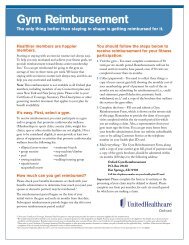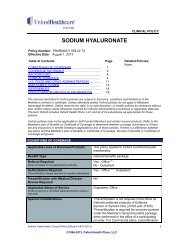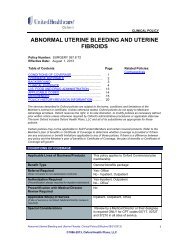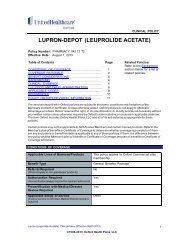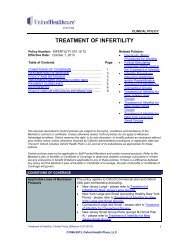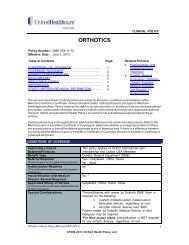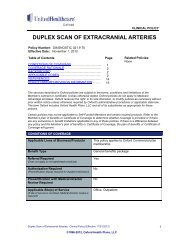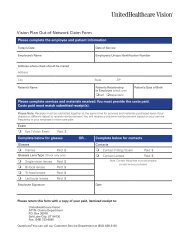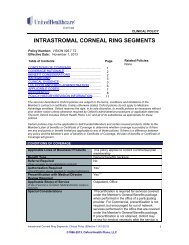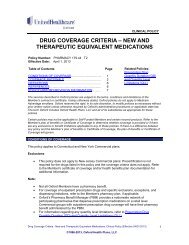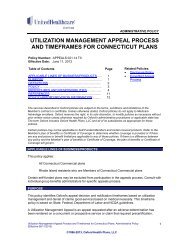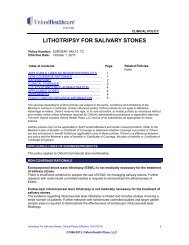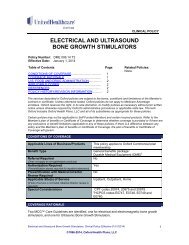observation care evaluation and management codes - Oxford Health ...
observation care evaluation and management codes - Oxford Health ...
observation care evaluation and management codes - Oxford Health ...
Create successful ePaper yourself
Turn your PDF publications into a flip-book with our unique Google optimized e-Paper software.
CPT ®Code99219992209922499225992269923499235Descriptionqualified health<strong>care</strong> professionals, or agencies are provided consistent with the natureof the problem(s) <strong>and</strong> the patient's <strong>and</strong>/or family's needs. Usually, the problem(s)requiring admission to "<strong>observation</strong> status" are of low severity. Typically 30 minutes arespent at the bedside <strong>and</strong> on the patient's hospital floor or unit.Initial <strong>observation</strong> <strong>care</strong>, per day, for the <strong>evaluation</strong> <strong>and</strong> <strong>management</strong> of a patient, whichrequires these 3 key components: A comprehensive history; A comprehensiveexamination; <strong>and</strong> Medical decision making of moderate complexity. Counseling <strong>and</strong>/orcoordination of <strong>care</strong> with other physicians, other qualified health<strong>care</strong> professionals, oragencies are provided consistent with the nature of the problem(s) <strong>and</strong> the patient's<strong>and</strong>/or family's needs. Usually, the problem(s) requiring admission to "<strong>observation</strong>status" are of moderate severity. Typically 50 minutes are spent at the bedside <strong>and</strong> onthe patient's hospital floor or unit.Initial <strong>observation</strong> <strong>care</strong>, per day, for the <strong>evaluation</strong> <strong>and</strong> <strong>management</strong> of a patient, whichrequires these 3 key components: A comprehensive history; A comprehensiveexamination; <strong>and</strong> Medical decision making of high complexity. Counseling <strong>and</strong>/orcoordination of <strong>care</strong> with other physicians, other qualified health<strong>care</strong> professionals, oragencies are provided consistent with the nature of the problem(s) <strong>and</strong> the patient's<strong>and</strong>/or family's needs. Usually, the problem(s) requiring admission to "<strong>observation</strong>status" are of high severity. Typically 70 minutes are spent at the bedside <strong>and</strong> on thepatient's hospital floor or unit.Subsequent <strong>observation</strong> <strong>care</strong>, per day, for the <strong>evaluation</strong> <strong>and</strong> <strong>management</strong> of a patient,which requires at least 2 of these 3 key components: Problem focused interval history;Problem focused examination; Medical decision making that is straightforward or of lowcomplexity. Counseling <strong>and</strong>/or coordination of <strong>care</strong> with other physicians, other qualifiedhealth<strong>care</strong> professionals, or agencies are provided consistent with the nature of theproblem(s) <strong>and</strong> the patient's <strong>and</strong>/or family's needs. Usually, the patient is stable,recovering, or improving. Typically 15 minutes are spent at the bedside <strong>and</strong> on thepatient's hospital floor or unit.Subsequent <strong>observation</strong> <strong>care</strong>, per day, for the <strong>evaluation</strong> <strong>and</strong> <strong>management</strong> of a patient,which requires at least 2 of these 3 key components: An exp<strong>and</strong>ed problem focusedinterval history; An exp<strong>and</strong>ed problem focused examination; Medical decision making ofmoderate complexity. Counseling <strong>and</strong>/or coordination of <strong>care</strong> with other physicians,other qualified health<strong>care</strong> professionals or agencies are provided consistent with thenature of the problem(s) <strong>and</strong> the patient's <strong>and</strong>/or family's needs. Usually, the patient isresponding inadequately to therapy or has developed a minor complication. Typically 25minutes are spent at the bedside <strong>and</strong> on the patient's hospital floor or unit.Subsequent <strong>observation</strong> <strong>care</strong>, per day, for the <strong>evaluation</strong> <strong>and</strong> <strong>management</strong> of a patient,which requires at least 2 of these 3 key components: A detailed interval history; Adetailed examination; Medical decision making of high complexity. Counseling <strong>and</strong>/orcoordination of <strong>care</strong> with other physicians, other qualified health<strong>care</strong> professionals oragencies are provided consistent with the nature of the problem(s) <strong>and</strong> the patient's<strong>and</strong>/or family's needs. Usually, the patient is unstable or has developed a significantcomplication or a significant new problem. Typically 35 minutes are spent at the bedside<strong>and</strong> on the patient's hospital floor or unit.Observation or inpatient hospital <strong>care</strong>, for the <strong>evaluation</strong> <strong>and</strong> <strong>management</strong> of a patientincluding admission <strong>and</strong> discharge on the same date which requires these three keycomponents: a detailed or comprehensive history; a detailed or comprehensiveexamination; <strong>and</strong> medical decision making that is straightforward or of low complexity.Counseling <strong>and</strong>/or coordination of <strong>care</strong> with other physicians, other qualified health<strong>care</strong>professionals or agencies are provided consistent with the nature of the problem(s) <strong>and</strong>the patient's <strong>and</strong>/or family's needs. Usually the presenting problem(s) requiringadmission are of low severity. Typically, 40 minutes are spent at the bedside <strong>and</strong> on thepatient’s hospital floor or unit.Observation or inpatient hospital <strong>care</strong>, for the <strong>evaluation</strong> <strong>and</strong> <strong>management</strong> of a patientincluding admission <strong>and</strong> discharge on the same date which requires these three keyObservation Care <strong>and</strong> Evaluation <strong>and</strong> Management Codes: Reimbursement Policy (Effective 04/01/2013)©1996-2013, <strong>Oxford</strong> <strong>Health</strong> Plans, LLC4



